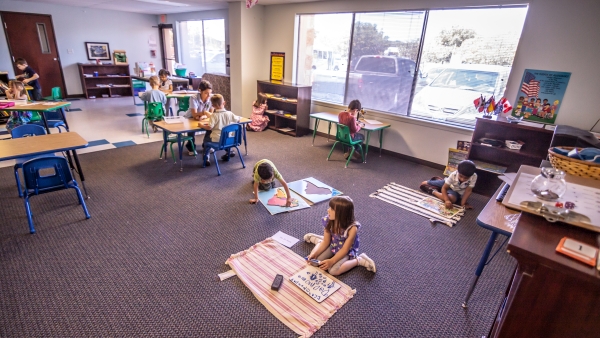
Pedagogy is an approach to teaching. A school’s pedagogy typically includes a theory of learning and a plan to incorporate that philosophy into lesson plans.
Developed in the early 1900s, the Montessori method is one of the oldest pedagogies currently in use. Maria Montessori developed her pedagogy by observing students and looking for educational activities that produced measurable results. Today, Montessori schools use her teachings to develop strong curriculums that prepare students for real-life success.
Montessori Pedagogy
The philosophy of the Montessori method centers around the idea that learning is best accomplished with curated educational experiences presented through a flexible, hands-on, and individualized approach. Students are given the chance to learn at their own pace, and lessons are chosen based on the teacher’s observations of the child’s skills and interests.
Teachers play an important role in Montessori education. The philosophy of freedom within limits inherently relies on a teacher’s active and engaging presence in the classroom. Although lectures may be rare, every student can expect one-on-one lessons and regular tutoring in subjects they struggle with. The teacher’s job is to curate learning materials and lesson plans that will improve their students’ chances of success.
The Four Areas of Learning
Every Montessori school has a unique curriculum that reflects the needs of individual students. However, regardless of grade level, students can expect to learn lessons from the same four categories.
Math and Science: Montessori schools teach basic math skills early and continue to reinforce mathematical and scientific concepts throughout a child’s education. From counting beads to solving problems, Montessori students typically have advanced math scores when they enter elementary school.
Language and Reading: The Montessori method teaches language from a phonetics standpoint. Montessori students learn to associate sounds with letters and quickly have a grasp of more complicated words. Reading is encouraged at all skill levels, and students are free to progress at a pace that works for them.
Sensorial: Sensory learning is particularly important during an early Montessori education. Students are given access to a wide variety of learning materials. With the main focus on developing and refining the child’s five senses. Such materials as the color tablets, sound cylinders, and the geometric cabinet are among just a few materials that will help the child to focus on a particular sense.
Practical Life: Montessori education places an emphasis on real-life skills. The materials are created with a purposeful task in mind. Each material develops fine motor control and coordination, and develops independence, concentration, and a sense of responsibility. There are two fundamental areas of development that the Practical Life works focus on: care of self, and care of the environment.
Evolution of the Montessori Method
A large part of the success of the Montessori method comes from how easily the philosophy can be adapted to modern learning. No matter the curriculum or the context, any classroom can benefit from the principles of hands-on learning and individualized lesson plans.
The Montessori method acts as an educational framework that allows students to get the information they need at a pace that works for them. Great Montessori teachers go out of their way to base lesson plans on modern academics and up-to-date information. Learning materials evolve alongside modern technology, and students are taught real skills that will be applicable to the world they live in.
The Montessori method is an all-encompassing approach to learning that favors a child’s natural inclinations. Although subjects and learning materials might change, Maria Montessori’s philosophy remains apparent in every lesson plan.





















